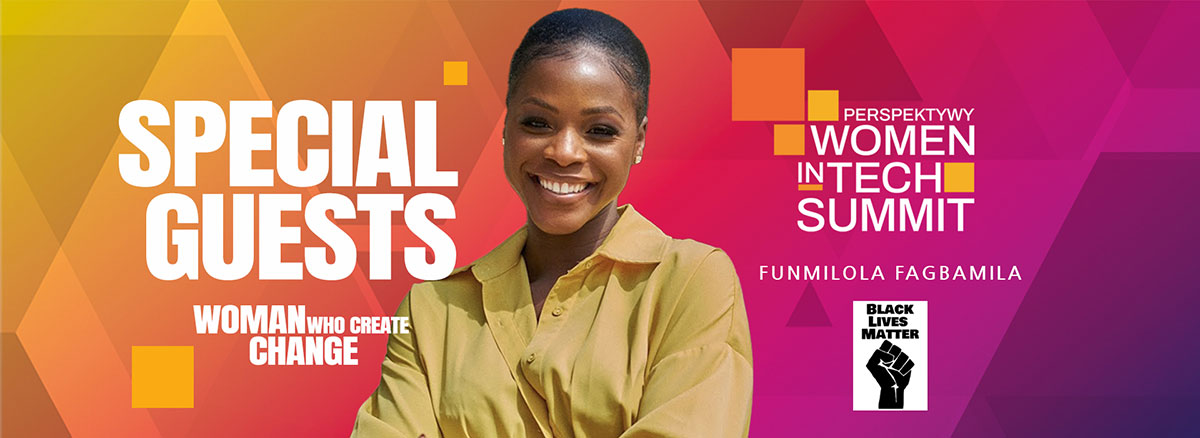Funmilola Fagbamila
A Nigerian, living and working in the US. She wants to inspire (Black Girl Fly) the black girls to soar on the wings of their ambitions, dreams, and talents, instead of allowing themselves obediently to be locked in the racist and patriarchal prisons. She speaks (The Intersection) about African Americans’ different attitudes towards racism and about the need to join forces for the common cause, about the need to rise above the political differences. This is Funmilola Fagbamila – a playwright, performer, lecturer of the Pan African Studies at the California State University (Los Angeles), activist for the racial equality, founding member of Black Lives Matter.
Her The Intersection performance has been presented in different countries in the world (incl. USA, France, Holland, Brasil) and was appreciated by such persons as Angela Davis (a feminist, tied to the Black Panthers movement, professor of the University of California, Santa Cruz) or Erykah Badu.
Her viral creation Black Girl Fly (created for the Black History Month) has been viewed over 4 million times, and in 2021 it was recorded and published in the USA by the TNT network.
Her activities, not just in art and science, but also in social activism, focus on discrimination due to origin, race or gender. Fagbamila is one of the founders (2013) of the international Black Lives Matter movement, fighting for the rights of black people and regularly organising protests against political violence towards such people and the injustice they face at courts. In BLM she was (2017–2020) an arts and culture director of the Los Angeles branch.
Her texts and words have been quoted in materials published by such media as „The Guardian,” BBC, NPR, NOW THIS News, Blavity, FOXtv, and Netflix. Fagbamila was also invited to speak at such universities as UCLA School of Law, Oxford University, Dartmouth, Stanford, and Harvard, among others.
Her social commentary in “Le Monde” has been read by the French president Emmanuel Macron, who invited her to Paris for a debate on France’s strategy in dealing with the problems resulting from its colonial past.
In one of her interviews she explained: “Throughout my adult life, I have considered the condition of black people and even more specifically the condition of black women and girls under a system that I can identify as a white supremacist patriarchy. And the way which that can limit the potential of black women and girls, and I wanted to advocate in this poem that I wrote, I wanted to advocate for black girls being freed to be, to thrive, to learn, to grow, nor not feel their human being is going to be intimidating or challenging to others.”
Her life motto: “Be clear about what you desire and what you require, what you accommodate and what you will not tolerate. But be flexible enough to offer the people in your life the time to evolve. This is grace.”
Fagbamila has been appreciated by, among others, Amplify Africa and the US Congress (2018) for perfection in education.
Nigeryjka, która mieszka i pracuje w USA. Chce zainspirować (Black Girl Fly) czarne dziewczyny, by wzleciały na skrzydłach swoich ambicji, marzeń i talentów, zamiast posłusznie dać się zamykać w rasistowskich i patriarchalnych więzieniach. Mówi (The Intersection) o różnych postawach Afroamerykanów wobec rasizmu i o konieczności połączenia sił we wspólnej sprawie, o potrzebie wzniesienia się ponad polityczne różnice. Oto Funmilola Fagbamila – dramatopisarka, performerka, wykładowczyni na Pan African Studies na California State University (Los Angeles), aktywistka działająca na rzecz równości rasowej, członkini założycielka ruchu Black Lives Matter.
Jej performance The Intersection był wystawiany w różnych krajach świata (m.in. USA, Francja, Holandia, Brazylia) i doceniły go takie osobistości jak np. Angela Davis (feministka, związana m.in. z ruchem Czarnych Panter, profesorka na Uniwersytecie Kalifornijskim w Santa Cruz) czy Erykah Badu.
Jej wiralowy utwór Black Girl Fly (powstał z okazji Black History Month) obejrzano ponad 4 miliony razy, a w 2021 r. został nagrany i był rozpowszechniany w USA przez sieć TNT.
Jej działania nie tylko na polu sztuki czy nauki, ale także aktywizm społeczny zogniskowane są wokół problematyki dyskryminacji ze względu na pochodzenie, rasę czy płeć. Fagbamila jest jedną z założycielek (2013) międzynarodowego ruchu Black Lives Matter (Czarne życia mają znaczenie), który walczy o prawa osób czarnoskórych i regularnie organizuje protesty przeciw przemocy policyjnej wobec takich osób i niesprawiedliwości, z jaką stykają się w sądach. W BLM pełniła (2017-2020) funkcję dyrektorki ds. kultury i sztuki w oddziale w Los Angeles.
Jej teksty i wypowiedzi cytowano w materiałach publikowanych przez takie media, jak „Guardian”, BBC, NPR, NOW THIS News, Blavity, FOXtv i Netflix. Fagbamilę zapraszano też jako mówczynię na takie uniwersytety, jak m.in. UCLA School of Law, Oxford University, Dartmouth, Stanford i Harvard.
Jej komentarz społeczny w „Le Monde” przeczytał prezydent Francji Emmanuel Macron i zaprosił ją do Paryża na debatę dotyczącą strategii Francji w zakresie rozwiązania problemów wynikających z kolonialnej przeszłości kraju.
W jednym z wywiadów tłumaczyła: „Przez całe moje dorosłe życie zastanawiałam się nad kondycją czarnych ludzi, a szczególnie nad losem czarnych kobiet i dziewcząt w systemie, który mogę określić jako biały supremacjonistyczny patriarchat. Myślałam też nad sposobami, na jakie ten system może ograniczać potencjał czarnych kobiet i dziewcząt. Uważam, że czarne dziewczęta muszą zostać uwolnione, aby się rozwijać, uczyć, wzrastać i nie czuć, że ich istnienie stanowi wyzwanie dla innych”.
Jej motto życiowe: „Jasno określać to, czego się pragnie, czego się wymaga i czego nie będzie się tolerować. A jednocześnie być na tyle elastycznym, aby pozwolić innym ludziom dokonać w twoim życiu zmian”.
Fagbamila została doceniona m.in. przez Amplify Africa i Kongres USA (2018) za doskonałość w dziedzinie edukacji.









